| Software Music Machine Archive |
|
The Top 10 Free VST Virtual Instruments
Submitted by Jason on Sun, 08/29/2010 - 10:27.
Maybe you're just starting out with VST Plugins, or maybe your an old hand, whatever the case this list of the most popular free VSTi plugins on SMM will give you some ideas for adding to your collection of virtual instruments.
We compiled this collection of free VST plugins based upon download, user feedback, and reviews at this site.
Only one Mac plug-in made the list of the best free vst plugins, so if you think we should compile a Top 10 for Mac, or if you have any other suggestions, please leave a comment below.
* A list dedicated to Mac is now here
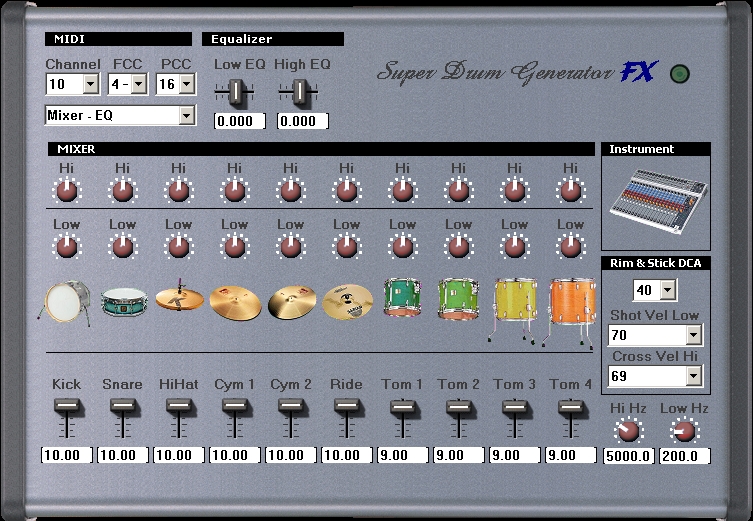
|
1. SuperDrumFXWindows |
A drum sampler with the main goal of sounding like a real acoustic drum set. This goal is reached through the use of sound shaping techniques on a 13 MB sample set. |
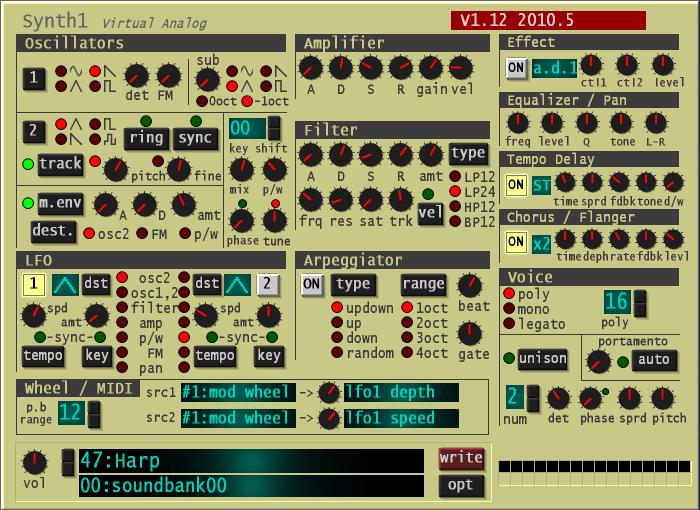
|
2. Synth1Windows |
Functionally modelled on the Clavia Nord Lead 2 Red Synth, this has many features including:
|
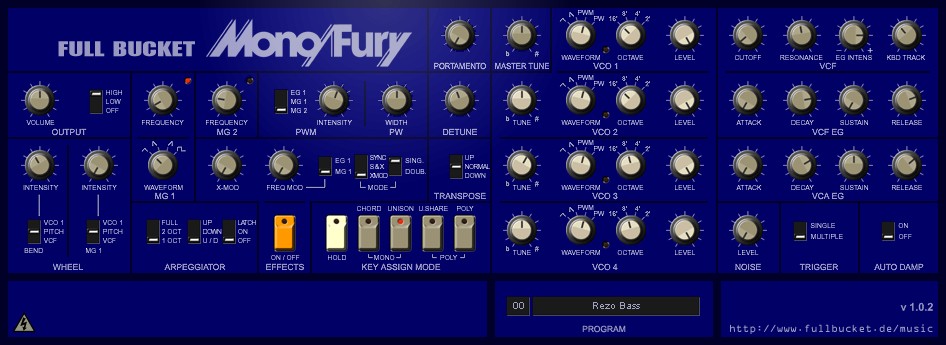
|
3. Mono/FuryWindows |
Emulating the classic KORG Mono/Poly analog synthesizer of the early 1980's, some of it's main features are:
|
|
Advertisement:
|
||
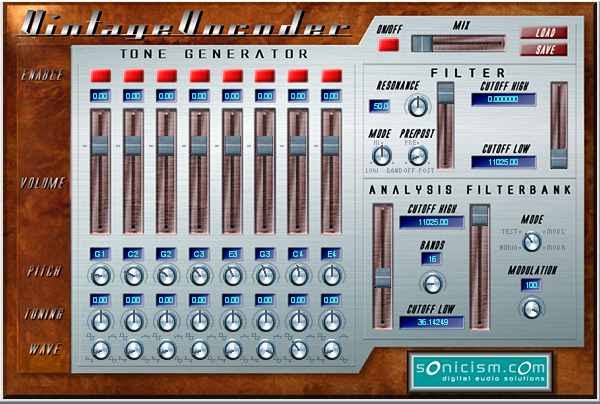
|
4. Vintage VocoderWindows |
An oldie, but a goodie. Also works as a DXi plugin. If you don't know what a vocoder is then it's technically a synth but used primarily for providing effects - often used by artists such as Daft-Punk and Kraftwerk. For more information about Vocoders see the Wikipedia Vocoder Page |

|
5. Independence FreeMac |
Sampler with an intuitive user interface, powerful file management, ultra fast streaming integration, Auto-RAM-Cleaner, and unique browser page with information batch tool and drag'n'drop support and Multi-Core support to allow for loading an unlimited number of instruments in seconds. |
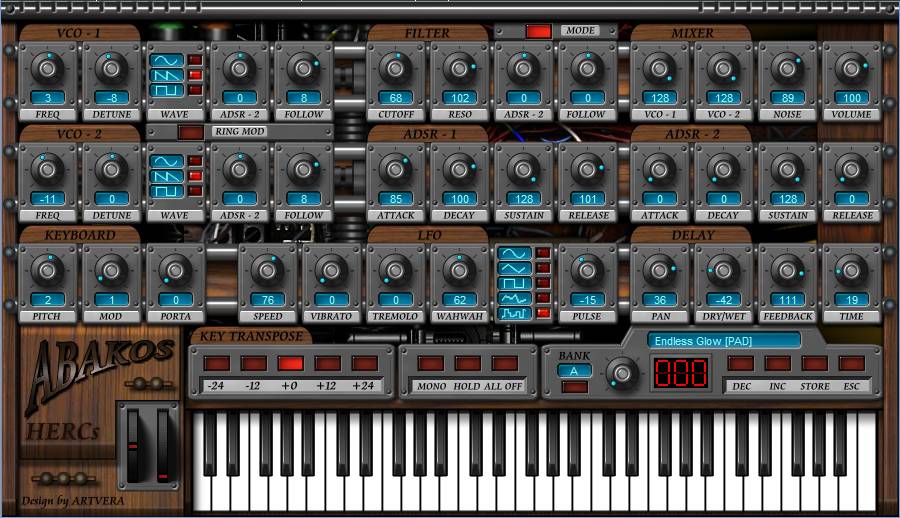
|
6. AbakosWindows |
An analog synth from a company that discontinued it's commercial operations, however this plugin remains a popular free download despite the lack of ongoing support. |
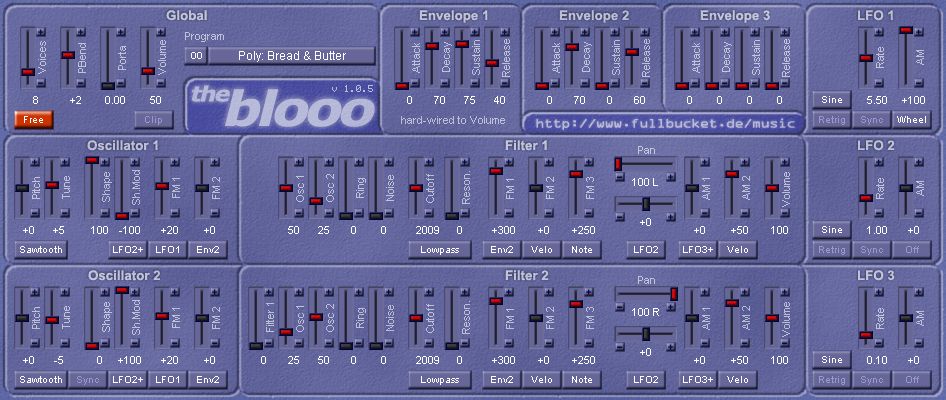
|
7. bloooWindows |
A synth based on classic subtractive synthesis architecture. Features include:
|
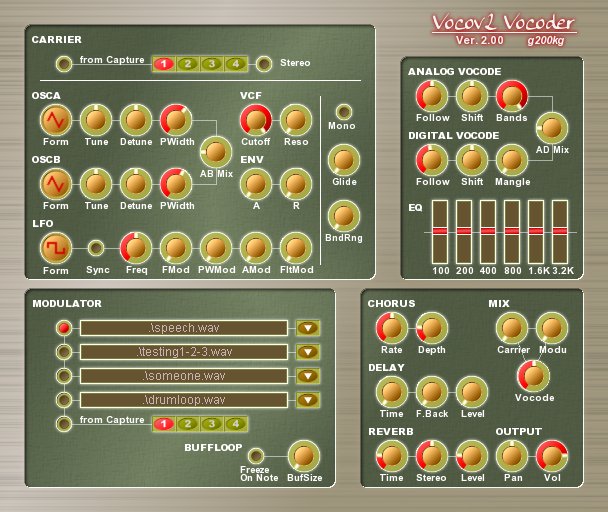
|
8. Vocov2 VocoderWindows |
The second vocoder to make it into the Top 10, this one has an additional modulator audio capture plug-in. Some features are:
|
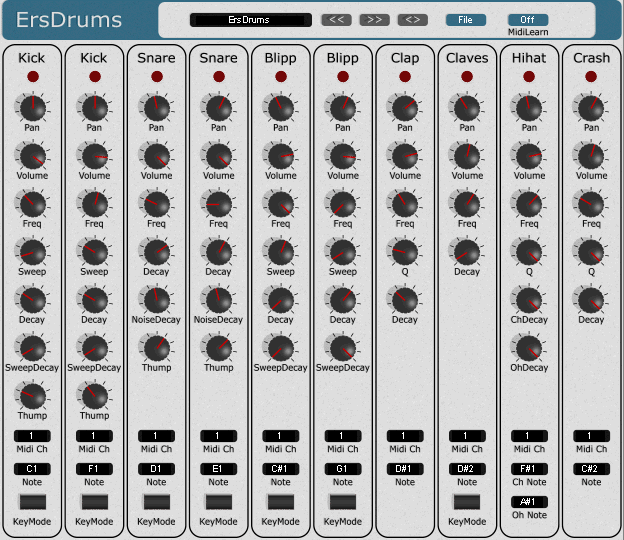
|
9. ErsDrumsWindows |
Another plugin that's been around for a few years now, this drum machine remains a popular free download. It synthesizes the sounds in real time without the use of samples. Small and light - it's a quick way to get some basic percussion in your tracks. |
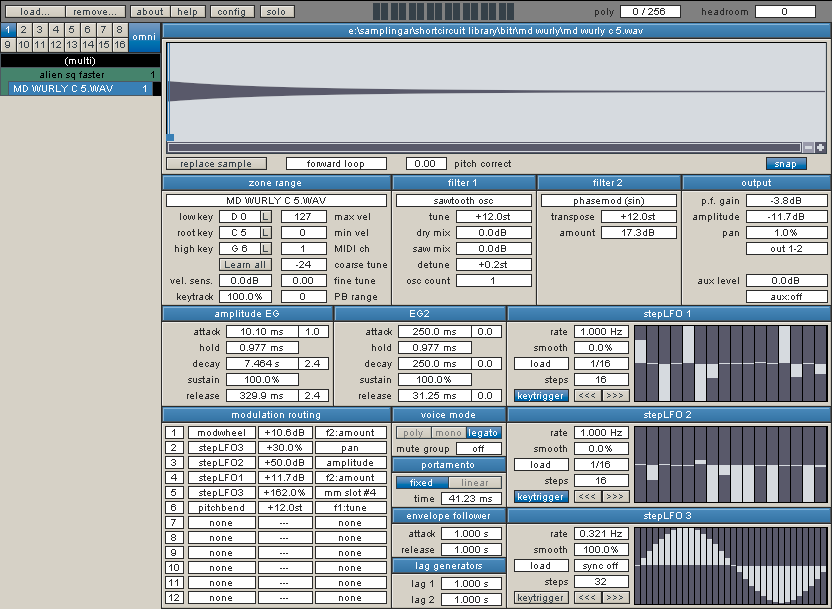
|
10. Shortcircuit 2Windows |
A sampler that was discontinued as a commercial product and is now a free download. It was created as a reaction against the ongoing trend where software samplers were being designed with the primary intent of library playback. It is intended for people who consider a sampler to be a musical instrument in its own right. |
Related Article:
The Top 7 Delay VST Plugins
Share This Article |
Check out this site...
Advertisement
Top-ten freeware VST's
Always interesting to see what comes up in a collection such as this one. Good to see that it's not a roundup of the
"usual suspects" or a repeat of a survey on KVR, but what seems a genuine, modern and recent grouping of VST's.
Best of all, the majority are synths and effects that I'm just learning about, and have yet to get hands-on with! Thanks to
the Hitsquad and its fans and devotees for taking the time to pare down what can be an overwhelming field of (sometimes
comically or tragically useless) freeware VST synths that's out there!
Top VST Virtual Instruments
I have noticed that most of your information is geared towards PC users. Yet, 90% of home studios and virtually all of the professional studios that I have been in have been Mac-based.
What's up?
This list was complied by
This list was complied by jmanme after I gave him the download logs for our plugins collection, and it turned out only one Mac plugin made the list.
I can see from the comments here, and on reddit, that a list dedicated to Mac is in order, so we'll get to work and produce a list for Mac soon.
Jason.
Your comment about Macs and PCs
Macs are not the kind of platforms that inspire as many freeware programs as Windows-type PC's, as it has been from nearly the beginning of there being basically two kinds of personal computer competing in the market. Since Apple's hardware designs are proprietary; or at least more so than the Intel-AMD based machines, it has been less open to 3rd party 'do-it-yourself' sorts of software enterprises, for better or worse. One of the best consequences of this arrangement since IBM spilled the beans on its own and compatible hardware design details, IMHO, is the Steinberg's groundwork in promoting software synthesis through its origination of the VST and VSTi software development kits, including design protocols, standards, and relevant tools, and making these things either very affordable or entirely free to spur innovation in its own field.
While Apple has done commendably well in its own way, it hasn't done much for independent software designers and tends to rein them in, while the Win PC experimenter is free to be creative, though this kind of innovation doesn't always lead to the most stable and
predictable result.
Thank you for the prompt,
Thank you for the prompt, thoughtful, informative response!
prompt-thoughtful-informative responses 8o]
I guess a bout with insomnia and some browsing about on SMM-Hitsquad got some benefit for you. I have a 13-year old stepdaughter who is always boasting about the Mac machines she uses at school and making obscene remarks about our 8-yrs.
old, on it's 3rd power supply and 3rd primary hard drive Compaq running XP-pro Service Pack 3. I've installed all the upgrades
I can find, since Microsoft is supporting XP SP3 for another 2-3 years, and after a lengthy, thorough debugging it's (again) running
great.
I think that it would be great to have a Mac G5 or some other powerhouse to speed the creative process or to use in any other commercial environment where time is money, and I'm no salesman, or other shill for brand X; but I find it curious the way it turned out and how the Windows machines have become rather the everyman sort of platform. The history has more depth and fascination
even than this, with the shared roots of the Basic language and pictorial-driven OS. If you care to investigate, there's a good documentary out there called "War of the Geeks," or something like that.
Mac vs PC - Why It Doesn't Matter
Fundamentally, both PC and MacIntosh platforms run on similar, sometimes even the same hardware. The only problem seems to be that Mac OS is designed to install on Mac-Specific (proprietary) platforms - but there are plenty of work-around options for this if you own a PC. If you're in the market for an upgrade, consider the possibility of owning a PC with an extra, high-speed hard drive for MacIntosh OS. There are instructions for installing Mac OS on a non-proprietary computer all over the internet - just make sure you have hardware that meets the performance requirements for Mac OS and you're usually good to go.
As a case in point, I own a computer with an i7 920 Intel Quad Core processor, a DX50SO Motherboard, 5GB of Ram (3x1GB, 1x2GB - not efficient, but it's a work in progress), an ATI Radeon HD 4850 Video Card, a 500 GB Hard Drive, a 1000W Power Supply, 8 USB ports and 2 Firewire ports. There are plenty of ways out there on the internet to install Mac OS on a PC, given that the differences in hardware are nominal.
The point is, pretty soon once a lot of people know how to do it, there may not even be a PC vs Mac contention at all, and there shouldn't be. If you really want to run Mac but don't want to shell out $2500 for a Mac Pro with less performance than a PC with an Intel i7 Quad Core Processor (which performs better than the Intel Quad Core Xeon that comes with a MacIntosh), you could save yourself TONS of money. My computer was $750.00 refurbished with all the hardware I listed above.
Don't be fooled by the contention between Mac and PC. Just find great deals on good, up to date hardware, and work around the problems these companies create with their foolishness.
Why It Doesn't Matter
I had heard rumor, though I haven't investigated very far, that the hardware was getting to be more of a shared concern. Maybe the big difference in prices (advantage PC) and the reputation for user accessibility for the more non-technically minded user (advantage Apple) has been narrowing also? If you're technically proficient enough to hot-rod them (or build-to-suit for high performance,) I imagine by now it's very much a question of taste.
A Question of Taste...?
... or a question of $$... maybe? Sorry, I just don't see the point in paying for a Mac for the convenience. Our society is too addicted to convenience, which is why people pay more money so they generally don't have to learn more than they already know. Unfortunate, but true. :(
$$$ ? Open architecture?
People who frequent this spot on the Internet probably could care less, because they're more about process than
creativity; but I would wager that fewer than 1 of 10 "full-time, paying hundreds of dollars per hour in the studio type"
musicians know what microprocessor their computer has, or give two hoots about it. Most wouldn't confess to owning one.
They just want that "bama-chaka-bama-bama-frizzzzz" sound that they hear in their heads, and they want it two minutes ago.
What they get (traditionally, though the gap is narrowing) in an Apple Mac platform is reliability and rapid, easily obtained results more aligned with the musical instincts of what other artists have gotten. Less is more when the main object is to unleash the creative process and Macs (oddly, I'm stuck doing things with a PC, due to financial constraints) tend to have a more intuitive interface, not to mention their sheer reputation for quality amongst the arty types. (Compare the Steve Jobs/Wozniak image to Bill Gates in this
respect....)
OK...I understand about the
OK...I understand about the open architecture, etc. But, that doesn't explain why the Mac seems to be the overwhelming choice of recording studios.
It's a historical thing, nothing more.
It largely stems from the fact that Macs were the first general-purpose computer that record could direct to hard disk in a manner good enough to compete with tape. The reasons for this were twofold:
1) The Mac began with a GUI and a 32-bit architecture, which was the minimum acceptable platform good enough for recording (and many other things, like desktop publishing.) Meanwhile, the PC began with a 16-bit architecture and a huge installed base of DOS users which held it (and Microsoft) back for years.
2) Digidesign built a set of proprietary DSP cards for the Mac that made it possible to mix "in the box", albeit expensively. This was necessary because the Mac's processors were not fast enough to mix natively, unlike today where hardware-assisted DSP is almost completely unnecessary.
The combination of those two items allowed Pro Tools & Macs to establish a beachhead in recording studios that still exists today. Musicians, wanting a piece of this action for themselves, took the path of least resistance and bought Macs also, thereby creating an attractive audience for early music software developers.
In modern times, there's are few good reasons for Macs to be as dominant in pro audio as they are. It's a historical thing, nothing more.
Historical Image
I recently met a graphic designer who had just bought a new Mac to do her work on.
I asked her why she chose Mac over PC and she replied with something along the lines of...
"It's because Mac supports one of the most important aspects of the creative process, I get to look down my nose a PC users"
True story, although she said it with a cheeky grin on her face :)
Good Reasons??
"In modern times, there's are few good reasons for Macs to be as dominant in pro audio as they are. It's a historical thing, nothing more."
Are you implying that there are actually any good reasons for Macs to still be dominant in pro audio, or that the reasons that once existed are no longer relevant? It seems to me that if the architecture of Macs is no longer a differential point to that of PC's, that there are no longer any good reasons at all for running Mac over PC...
The only reason I even bring this up is because of the extraordinary discrepancy between cost and value today. What are you really getting that's "different" with a Mac than with a PC? Mac has been exceptionally driven to close itself off from the larger community of programmers and computer specialists in its methods of conducting business, all in the name of segmenting the market to establish its brand - which is great business at the cost of horrendous ethical practices in my opinion.
Those who "know" tend to side against Mac based on philosophical and ethical reasons. Mac panders to a "market", not society on the whole. They demonstrate their greed by still charging over $3,000 for it's top-end computer model with performance that is now demonstrably inferior to a PC one can acquire for 50% of the cost at RETAIL. With the internet, anyone paying retail price for a PC is still paying too much, so put that into perspective and Mac is more than "overcharging" for the performance of their product.
Reasons?
Welcome to the realities of the world of (so-called) market-driven forces in merchandising, Shaun. This is the area of market enterprise that gave us a Korean knock-off of the Fender Stratocaster guitar that was obviously, in every physical way, superior to the Strat itself that whatever entity that owns the brand had to run for trademark and tariff protection in the 1980's. The Korean company had to change some design features that degraded its performance. The brand I recall was Tokai, but there may have been others, and the price was from 20% to 30% of what a "real" Strat was selling for. It has less to do with fairness or "supply-and-demand" than it does with international and national politics, and the principle of charging "whatever the market will bear." I hope you were hoping to learn how to be cynical. 8-}
Historical thing
Thanks CapnZilog, that's the best, most complete, and informed answer that I've heard to this question.
...
Convenience?
Top VST Virtual Instruments
I have noticed that most of your information is geared towards PC users. Yet, 90% and virtually all of the professional studios that I have been in have been Mac-based.
What's up?
Mac plugins are here...
There is a list dedicated to Mac plugins - both VST & AU - at http://www.hitsquad.com/news2/Top_10_Free_VST_AU_Virtual_Instruments_for...